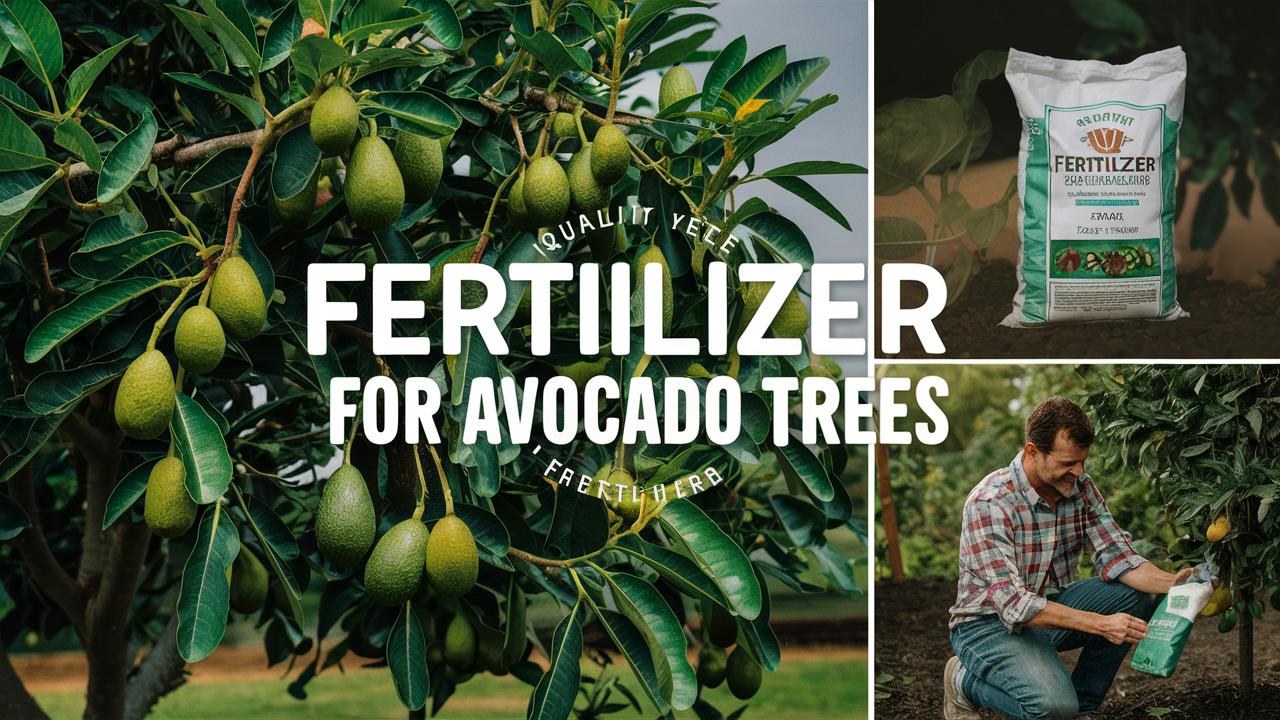This comprehensive guide will explore how to choose a fertilizer for avocado trees, touching on the nutritional requirements, types of fertilizers available, application methods, and more.
Fertilizer For Avocado Trees
| Image | Name | Rating | Shop |
|---|---|---|---|
 | Citrus & Avocado Tree Fertilizer |  | |
 | Avocado Fruit Fertilizer |  | |
 | Miracle-Gro Shake ‘N Feed |  |
Citrus & Avocado Tree Fertilizer
This True Organic Citrus & Avocado Food is a solid choice when it comes to fertilizing your avocado trees. It’s designed to promote lush green foliage, abundant blossoms, and ultimately, lots of fruit.
The benefits of using this product are numerous. Its calcium-rich formula contains 7% calcium, which helps prevent blossom end rot and supports healthier tree development. Additionally, its organic ingredients like seabird guano, shrimp, and crab shell meal work to enhance soil nutrients and promote natural growth. You can use it for both in-ground and container-grown avocado trees, making it a versatile option.
Avocado Fruit Fertilizer
If you’re looking for a reliable fertilizer to keep your avocado trees healthy and thriving, consider the 32oz Fruit Tree Fertilizer for Avocados. This water-soluble plant food is specifically designed to provide micronutrients that promote lush growth and prevent yellowing leaves. Its formulation includes essential elements like magnesium, sulfur, iron, manganese, and zinc to support the development of bigger, healthier avocados.
This fertilizer is easy to apply, requiring just a tablespoon per gallon of water. For optimal results, aim for 1-2 applications per year, or increase to twice monthly if your plants show visible signs of nutrient deficiency. With its instant feeding action and broad compatibility (suitable for various fruit-bearing trees like citrus, mangoes, and oranges), the 32oz Fruit Tree Fertilizer for Avocados deserves consideration as a top choice for avocado tree care.
Miracle-Gro Shake ‘N Feed
Miracle-Gro Shake ‘N Feed Citrus, Avocado, Mango Plant Food is a good choice for fertilizing your avocado tree. This product contains added nutrients such as potassium, magnesium, sulfur, and iron to help address common deficiencies.
This plant food provides up to 3 months of continuous feeding, nourishing not only the soil above but also below it. It’s designed for citrus and mango trees as well, so you can use it regardless of the type of tree you have in your yard or indoor space. Just be sure to apply it evenly over the soil within reach of the branches when using in-ground or established container plants, then water to start the feeding process. For best results, reapply the product every 3 months and keep watering your plant regularly.
NutriStar
If you’re looking for a reliable fertilizer for your avocado tree, we highly recommend Nelson – Citrus Fruit & Avocado Tree Plant Food for In-Ground, Containers, & Patios. This granular fertilizer is specifically designed to provide essential nutrients like nitrogen, phosphate, and potassium to promote healthy growth and fruit production.
This formula is a great choice because it’s balanced to help trees grow strong and survive in colder weather. The inclusion of calcium also helps increase the size and strength of your tree’s trunks and limbs. Nelson Plant Food has been the leading landscapers’ choice for over 30 years, ensuring that you’re getting a premium product that’s researched and formulated with the specific needs of avocado trees like yours in mind.
Avocado Tree Fertilizer
The ‘Avocado Tree Fertilizer’ is a good option for taking care of your avocado tree. It’s a complete liquid food made with no fillers or artificial ingredients and helps to promote healthy growth.
This fertilizer comes in an 8 oz (250mL) bottle, making it easy-to-use. The instructions are straightforward and include tips on transplanting success, helping root development, and how to maintain vibrant foliage throughout the year. Overall, this liquid food is a solid choice if you’re looking for reliable nutrition for your avocado tree.
Citrus-tone fertilizer
Fertilizer For Avocado Trees – You can promote vigorous growth and abundant fruit on your avocado tree with the help of a good fertilizer. Considering this, we recommend Espoma Organic Citrus-Tone 5-2-6 Natural & Organic Fertilizer and Plant Food.
This product is specifically designed for use on citrus trees as well as avocado and nut trees, making it an ideal choice for your Avocado tree’s needs. Rich in natural and organic ingredients, including a Bio-tone formula and calcium (5%), Citrus-Tone fertilizer will help provide the essential nutrients necessary to support the growth of strong, healthy roots and a lush canopy on your Avocado tree. Apply Citrus-Tone as directed in late winter, spring, or fall for optimal results.
Citrus Fusion
For avocado trees, you’ll want a fertilizer that provides the right balance of nutrients, especially since these trees are notoriously particular about their diet. FoxFarm’s Happy Frog Citrus & Avocado Fertilizer is definitely worth a look – it’s specifically formulated to meet the unique needs of citrus and avocado trees.
This organic fertilizer boasts a rich blend of nitrogen for healthy growth, calcium for strong cell structure, and sulfur to improve nutrient uptake. Plus, it contains mycorrhizal fungi to boost root strength and promote a resilient tree. And don’t worry about complicated feeding routines – just apply 1-3 cups per growing season depending on your tree’s size, and you’re good to go! Overall, Happy Frog Citrus & Avocado Fertilizer offers a natural solution for eco-friendly gardeners who want to nourish their avocado trees without breaking a sweat.
Organic Avocado Fertilizer Concentrate
If you’re looking to give your avocado tree the care it needs to thrive indoors, we recommend giving Premium Liquid Avocado Plant Fertilizer – 3-1-2 Concentrate from Gardenera a try. This organic liquid fertilizer is specifically designed for indoor avocado trees and provides a balanced blend of nitrogen, phosphorus, and potassium that will promote lush foliage and encourage fruit production.
This concentrate is made entirely from organic ingredients and can be easily mixed with water to provide your tree with the precise nourishment it needs. With regular use, you can expect to see an abundance of creamy avocados and a robust root system that supports long-term health and productivity. Whether you’re caring for a young sapling or a mature tree, this versatile formula provides comprehensive care throughout every growth stage.
Fruit Tree Fertilizer
The Farmer’s Secret Fruit Tree Booster Fertilizer is a top-notch option for avocado trees. As a super concentrated and phosphorus-rich formula, it provides the necessary nutrients for optimal growth and fruit production.
This fertilizer is especially beneficial during the early growth cycle of your tree when proper nutrition is crucial. Simply dilute one teaspoon with one gallon of water and apply weekly along the drip line. For younger trees, use up to five teaspoons per week, while mature trees can handle up to 10 teaspoons per week.
How To Choose a Fertilizer For Avocado Trees
Growing avocado trees can be a rewarding experience, providing not only beautiful greenery but also delicious fruit. However, to ensure that your avocado trees thrive, proper nutrition is essential. Selecting the right fertilizer is crucial for their health and productivity.
Understanding the Nutritional Needs of Avocado Trees
Before diving into fertilizer selection, it’s vital to comprehend what avocado trees require to grow robustly. Avocado trees (Persea americana) thrive in a specific set of environmental and nutritional conditions. Key nutrients include nitrogen (N), phosphorus (P), potassium (K), magnesium (Mg), and calcium (Ca). Understanding these nutrients is the first step in choosing the right fertilizer.
Nitrogen is critical for leafy growth and overall plant vigor. It stimulates the production of chlorophyll, enhancing the tree’s ability to photosynthesize and produce energy.
Phosphorus plays a role in root development and flowering, which is essential as the tree matures and starts producing fruit.
Potassium supports fruit development and quality while also improving the tree’s resistance to diseases and environmental stresses.
Magnesium is involved in chlorophyll production and enzyme function, which are both vital for photosynthesis and overall health.
Calcium supports cell wall integrity and root health, crucial for maintaining a sturdy and productive tree.
Understanding the balance of these nutrients and how they interact can significantly influence the choice of fertilizer.
Assessing Soil Quality
Before selecting a fertilizer, it is wise to assess your soil quality. Avocado trees prefer well-draining soil that is rich in organic matter. Conduct a soil test to determine the pH level and nutrient levels present in your soil, which can significantly influence your choice of fertilizer. The ideal soil pH for avocado trees is between 6.0 and 6.5.
If the soil test indicates deficiencies in any major nutrients (N-P-K) or trace minerals (like magnesium and calcium), you can narrow down your fertilizer options accordingly. A comprehensive soil analysis helps prevent the risk of over-fertilizing, which can lead to nutrient burn or imbalances exacerbated by excessive application.
Types of Fertilizers
Now that you understand the nutritional needs of your avocado trees and have assessed your soil quality, it’s time to explore the types of fertilizers available. There are several categories, each with distinct characteristics, benefits, and drawbacks.
1. Organic Fertilizers
Organic fertilizers are derived from natural sources, such as plant or animal matter. They work slowly but improve soil structure and fertility over time.
Examples
Compost: A nutrient-rich option that improves soil health and provides a balanced array of nutrients.
Manure: Well-composted animal manure can serve as an excellent nitrogen source.
Bone Meal: High in phosphorus, beneficial for root development and flowering.
Kelp Meal: Offers trace minerals and hormones that promote growth.
Benefits: Sustainable, environmentally friendly, and improve soil health over time.
Drawbacks: More variable nutrient content; slower release; may require larger volumes.
2. Synthetic Fertilizers
Synthetic fertilizers are chemically manufactured and provide more immediate nutrient availability, which can be beneficial for addressing specific deficiencies quickly.
Examples
N-P-K Fertilizers: Commercially available granular fertilizers with various ratios to suit different growth stages.
Liquid Fertilizers: Easily applied through watering, providing fast nutrient uptake.
Benefits: Quickly address nutrient deficiencies, easier to apply precise amounts.
Drawbacks: Can lead to nutrient burn; risk of leaching and groundwater contamination.
3. Slow-Release Fertilizers
Slow-release fertilizers are designed to gradually deliver nutrients over time, reducing the need for frequent applications.
Examples
Controlled-Release Fertilizers: Coated granules that release nutrients based on soil temperature and moisture.
Benefits: Reduced risk of over-fertilization; fewer applications needed; consistent nutrient supply.
Drawbacks: Typically more expensive and require good initial soil conditions for optimal performance.
4. Fertilizer Blends
Some fertilizers are specially formulated for specific plants and conditions, including avocado trees.
Examples
Avocado Tree Fertilizer: Custom blends that include the right balance of N-P-K along with essential micronutrients tailored for avocados.
Benefits: Take the guesswork out of balancing nutrients; conveniently packaged.
Drawbacks: Can be more expensive; effectiveness dependent on soil conditions.
Choosing the Right Ratio
When selecting a fertilizer, the N-P-K ratio is a critical factor. For avocado trees, a balanced or slightly higher nitrogen fertilizer is often recommended during the early growth stages, typically a ratio such as 3-1-4 or 10-5-10.
As trees mature and start bearing fruit, a balanced fertilizer with moderate nitrogen and higher potassium and phosphorus, such as 4-1-5, may be beneficial. These ratios cater to the trees’ changing needs over time, supporting healthy growth, root development, flowering, and fruiting.
Timing Your Fertilizer Applications
Timing of fertilization can greatly influence the effectiveness of the nutrients and the overall health of your avocado trees. Generally, the growing season, which spans from early spring to late summer, is the optimal time to fertilize. Here’s a breakdown of a suggested timeline:
Early Spring: Apply the initial dose of nitrogen-heavy fertilizer as the active growth phase begins. This will support new leaf development and root health.
Mid-Summer: Consider a second application of fertilizer after the first flush of growth, maintaining nutrients to support ongoing development and fruit-set.
Late Summer to Early Fall: A balanced fertilizer application can help the tree prepare for dormancy while ensuring that it has sufficient nutrients for the upcoming fruiting season.
Considerations for Young vs. Mature Trees
For young avocado trees (1-3 years old), the emphasis should be on fostering vigorous growth, so nitrogen-rich fertilizers are recommended. For mature trees (4 years and older), a balanced or potassium-rich fertilizer is more beneficial to enhance fruit production and overall health.
Application Methods
How you apply fertilizer can significantly impact its effectiveness. Here are common methods used to fertilize avocado trees:
1. Broadcast Application
This method involves scattering granular fertilizer evenly across the soil surrounding the tree. This can be done using a fertilizer spreader or by hand. It’s best to avoid applying fertilizer directly against the trunk to minimize the risk of burning the tree.
2. Banding
Applying fertilizer in bands around the root zone can help ensure that roots have direct access to the nutrients. This method is especially effective for mature trees, where deeper rooting adds an extra layer of nutrient access.
3. Liquid Application
Liquid fertilizers can be mixed with irrigation water and applied directly to the soil. This method allows for rapid nutrient uptake, especially during the early growing season when trees have high nutrient demands.
4. Foliar Feeding
For a quick boost, foliar feeding can be an effective method for providing micronutrients directly through leaves. This is typically recommended in conjunction with soil fertilization to ensure balanced nutrient availability.
Considerations for Organic Practices
If you’re leaning towards organic gardening, maintaining soil health should be your paramount goal. This means incorporating organic practices such as:
Composting: Regularly add compost to your soil to ensure a constant supply of nutrients.
Mulching: Use organic mulches to conserve moisture, suppress weeds, and gradually enrich the soil as they break down.
Crop Rotation: Consider introducing companions or rotating with other plants to support biodiversity and soil health.
In organic systems, patience is often necessary, as nutrients are released more slowly than with synthetic options. However, the long-term benefits to soil health and environmental sustainability can be well worth the wait.
Potential Issues with Over-Fertilization
While fertilizing your avocado trees is critical, it’s essential to follow best practices to avoid over-fertilizing, which can lead to nutrient burn, poor fruit quality, and increased susceptibility to diseases.
Signs of Over-Fertilization: Yellowing leaves, burned leaf edges, excessive leaf growth with few flowers or fruit, and even root damage can indicate that your trees are receiving too much fertilizer.
Prevention: Stick to the recommended application rates, and if uncertain, err on the side of caution and apply a smaller amount. Always measure carefully, and keep an eye on tree health trends.
Monitoring Tree Health
After choosing and applying the appropriate fertilizer, monitoring your avocado trees regularly can provide insights into their health and nutritional status. Look for the following indicators:
1. Leaf Color
Healthy avocado leaves should be a vibrant green. Yellowing or discoloration can indicate nutrient deficiencies or excesses, prompting a reassessment of your fertilization approach.
2. Growth Patterns
Assess new growth; if your avocado tree seems to be growing too rapidly with excessive leaf at the expense of floral and fruit development, it might require a shift to a fertilizer with lower nitrogen.
3. Fruit Set and Quality
As avocado trees mature, evaluating the number and quality of avocados can indicate nutrient balance. Healthy trees typically produce a good yield of quality fruit.
Conclusion
Choosing the right fertilizer for your avocado trees requires a holistic understanding of their nutritional needs, soil quality, growth stage, and the types of fertilizers available. By considering all these factors, you’ll be well-equipped to select a fertilizer that supports healthy growth and bountiful fruit production.











